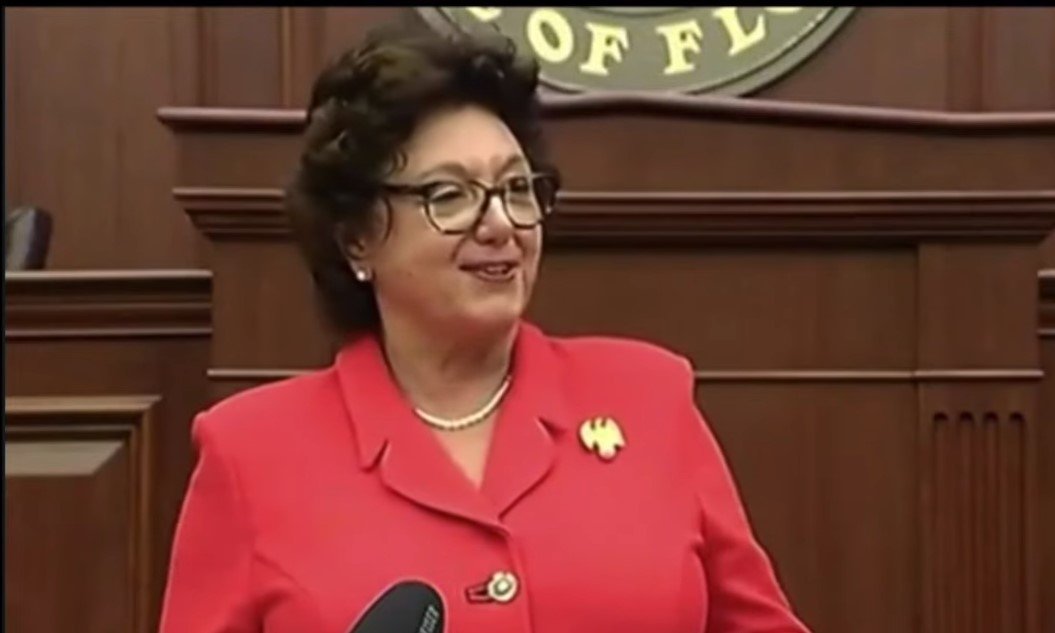Florida Gov. Ron DeSantis (Illustration: Donkey Hotey)
Feb. 23, 2022 by David Silverberg
When the Florida state legislature convenes on March 7, it will have a busy two months.
Dominated by Republican supermajorities, the Florida House and Senate are likely to implement the agenda of Gov. Ron DeSantis (R) to prepare the way for his now-obvious run for the presidency in 2024.
But no matter what the legislature’s other priorities—restricting abortion, encouraging gunplay, politicizing school boards, reducing local autonomy, narrowing academic freedom, restricting voting, bullying corporations, banning books, and waging war against a supposedly “woke” culture—there is one obstacle above all that may stand in the way of DeSantis’ presidential run.
Does Florida law allow DeSantis to actually formally declare himself a candidate and run while serving as governor or must he “resign-to-run?”
If the law does prohibit his run, will the legislature change the law to accommodate him?
Although there was considerable discussion of this in November following his strong re-election showing, the talk died down shortly thereafter.
Still, resign-to-run (which The Paradise Progressive will henceforth abbreviate as “R2R” for convenience’s sake—you read it here first) could be a big impediment.
The state of the law
Florida is one of four other states (Arizona, Georgia, Hawaii and Texas) that has an R2R law: an officeholder must resign his or her current office to seek another office.
Title IX, Chapter 99, Section 99.012 of the Florida Statutes states:
(2) No person may qualify as a candidate for more than one public office, whether federal, state, district, county, or municipal, if the terms or any part thereof run concurrently with each other.
(3)(a) No officer may qualify as a candidate for another state, district, county, or municipal public office if the terms or any part thereof run concurrently with each other without resigning from the office he or she presently holds.
(b) The resignation is irrevocable.
At first glance, this would seem to put a crimp in DeSantis’ plans; he wouldn’t be allowed to declare his presidential candidacy and mount a campaign without irrevocably resigning the office of governor.
However, as in all law, that’s open to interpretation.
One view: He doesn’t have to resign
Lilian Rodriguez-Baz, interviewed on the Wilkow! talk show. (Image: Wilkow!)
One view is that DeSantis doesn’t have to resign at all.
That was put forward by Lilian Rodríguez-Baz, a founder and legal counsel for Ready for Ron Political Action Committee (PAC).
“Armchair lawyers proven wrong again — DeSantis does not have to resign to run for POTUS,” was the headline of an article by her that appeared on Nov. 29 on the website Florida Politics (but which was subsequently removed).
While one cannot help but note that lawyers do almost all their work from armchairs, her argument deserves to be examined at length.
The notion that DeSantis would have to resign to run is an “idea as misleading as it is dangerous, and if left unchecked, it could cost Republicans the next election,” she wrote.
“As a lawyer, I look to the law, and on this point, the law is crystal-clear on its face: State officeholders do not need to quit their jobs in order to run for federal office — whether it’s the House, Senate, or presidency. Florida Statute Section 99.012, which governs this issue, has two relevant parts: Sub-sections (2) and (3). Those wrongly claiming DeSantis needs to resign are playing legal gymnastics by improperly conflating the two sub-sections.
“Sub-section (2) is straightforward. It provides, in plain English, that a person cannot qualify as a ‘candidate’ (e.g., be on the ballot) for two offices at the same time, including local, state, and federal offices.
“This is why Sen. Marco Rubio was unable to run for both President and U.S. Senate in 2016. Instead, he had to wait until the end of his presidential campaign to restart his Senate run. Unlike Rubio, however, this scenario is totally inapplicable to DeSantis given that he is the sitting Governor of Florida and would, therefore, not be a ‘candidate’ for two offices if he runs for President.
“Meanwhile, sub-section (3), which applies to DeSantis, makes it clear that an ‘officer’ (as defined by the Statute) cannot be the holder of a state-level or lower office while running for another state or lower position without resigning.
“However, the Florida Legislature specifically and intentionally removed the word ‘federal’ from the list of offices implicated in this section.
“In other words, there is no law that prevents DeSantis from holding the office of Governor of Florida while running for president at the same time.”
As an example of this, Rodriguez-Baz cites the instance of Sen. Rick Scott (R-Fla.). In 2018 Scott, still serving as governor of Florida, did not have to resign to run for the US Senate.
“Anti-DeSantis partisans, with their short memories, are so desperate to undermine the man poised to win the White House in 2024 (see: every poll) that they will resort to shoddy lawyering,” complained Rodriguez-Baz. “Unsurprisingly, those accusing DeSantis of attempting to change the law in his favor, are the very ones re-writing clear legislative directives in order to mislead the public.”
The bottom line, according to Rodriguez-Baz: “…The reality is this: DeSantis can run in 2024 (without resigning),” and her organization was working to convince him to do so (as though he needed that push).
Arguments and precedents
Whether Rodriguez-Baz’s argument is correct is something that may be determined in court if DeSantis simply declares his candidacy while governor.
The law has been challenged before: in 1970 a US District Court in northern Florida ruled that it didn’t apply to candidates for the US Congress, since federal congressional qualifications are governed by the Constitution.
In the Florida legislature, the most prominent advocate for changing the law is State Senate President Sen. Kathleen Passidomo (R-28-Naples). “If an individual who is Florida governor is running for president, I think he should be allowed to do it,” she told reporters on Nov. 22, 2022 after the election. “I really do. That’s a big honor and a privilege, so it is a good idea.”
State Sen. Kathleen Passidomo says a law change is “a good idea.” (Image: The Florida Channel)
Unsurprisingly, at least one Democrat disagrees. In November, State Rep. Anna Eskamani (D-47-Orlando) argued that if the law is in effect, DeSantis must be held to it.
During a November 23 interview with Dave Elias, the NBC 2 News political reporter in Fort Myers, Eskamani called the notion of changing the law “another example of how Florida Republicans will bend over backwards to please Governor DeSantis.”
She continued: “If we’re going to hold ourselves to standards that we must resign in order to run, that standard must be held to Governor DeSantis as well.”
State Rep. Anna Eskamani is interviewed by Dave Elias. (Image: NBC2)
Someone who has a lot of experience with the resign-to-run law is Charlie Crist. While Republican governor in 2008, he was considered for then-Sen. John McCain’s running mate. The legislature changed the law to allow him to do that but then changed it back again in 2018.
The 2008 change included a “carve out” that allowed an official whose term of office was about to end to seek another position and that allowed then-Gov. Rick Scott to run for the US Senate. He was allowed to stay in the governor’s office until the day his successor, DeSantis, was inaugurated.
In 2022, though, Crist, then a Democrat, resigned from the US House of Representatives to run for governor. Also resigning was Democratic Agriculture Commissioner Nicole “Nikki” Fried who sought the gubernatorial nomination but lost to Crist in the primary.
Analysis: Hanging over his head
Florida’s R2R law, could prove a stumbling block if not addressed by DeSantis.
Even if, technically, DeSantis can ignore it, as Rodriguez-Baz argues, it will haunt him when he formally declares his candidacy. If not clarified, it will always hang over his head, threatening the legitimacy of his candidacy, even if it ultimately proves little more than a distraction.
If he were the sole candidate running for the Republican presidential nomination in 2024, that would not matter. But, of course, that’s not the case. Even if DeSantis isn’t yet formally running, other candidates are already in the race.
Chief among these is former President Donald Trump, whose anti-DeSantis campaign to date has mainly consisted of schoolyard insults: “Ron DeSanctimonious,” “GLOBALIST RINO” (capitalization, of course, his) and the not-yet formally unveiled “Meatball Ron.”
Trump was supposedly also considering “Shutdown Ron,” in reference to COVID. “No, you dummy!” protested comedian Stephen Colbert. “Quit while you’re ahead! You’re never going to do better than the crystallized genius that is Meatball Ron!”
Then, on Feb. 14, Nikki Haley, the former South Carolina governor, declared her candidacy. She and Trump are likely only the first stones in what is sure to be an avalanche of Republican hopefuls and if DeSantis’ legal status isn’t clarified, all will be citing R2R to disqualify him.
There is always the possibility that DeSantis will suddenly be incapacitated or will choose not to run—but while nothing is totally impossible, those odds are extremely low given every move and decision he has made to date.
One way or another, DeSantis’ status as a governor-candidate will need to be determined finally and decisively. It can be done by a formal gubernatorial announcement, it can be done in court, or it can be done in the legislature. But even in Florida, where the concept of law itself is squishy, where constitutional amendments are routinely evaded and where even drivers ignore traffic rules, the law must ultimately be addressed.
Liberty lives in light
© 2023 by David Silverberg



